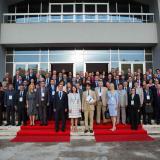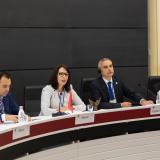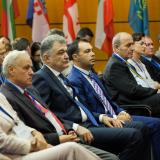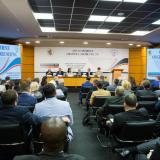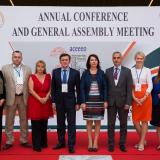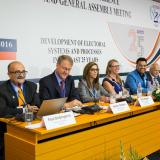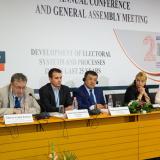Development of Electoral Systems and Processes in the last 25 years
Developments and Trends of the electoral systems in the last 25 years - World Leaders Summit of the Election Stakeholder Organizations
Moderator: Zsolt Szolnoki, Secretary General, ACEEEO
Participants: Tadjoudine Ali-Diabacte, Deputy Director of UNEAD, UNDP
Abdurashid Solijonov, Programme Officer, International IDEA
William (Bill) Sweeney, President, CEO, IFES
Lusine Badalyan, Senior Election Adviser, OSCE ODIHR
Gaël Martin-Micallef, Legal Advisor, Elections and Political Parties Division, Venice Commission
Juhwan Lee, Deputy Director, A-WEB
François Friederich, Head of Division of Electoral Assistance, Council of Europe
Plenary session I.
Electoral systems
Moderator: Arnis Cimdars, Chairman, Central Election Commission of Latvia
Speakers: Zoltán Pozsár-Szentmiklósy, Legal Expert, ACEEEO
Zoltán Pozsár-Szentmiklósy’s presentation
The four pillars analyzed in the research recently carried out in the ACEEEO member countries were (1) general structure of the electoral systems, (2) electoral legislation, (3) election management bodies and (4) safeguard of free and fair elections. Trends related to the electoral systems show that the future election structure could be based on some current experience that already exists in particular countries. Progressive elements are preferential votes or candidate rating that may contribute to the voters’ involvement in the elections. Another aspect is the techniques and legislation applicable in different countries favoring the minorities’ representation in elections, as well as the new election methods possible to use to cast the vote. The challenges refer to the accessibility of these techniques to all citizens and the equal basis for the structure. The last element highlighted in the presentation is the issue of gender. Nowadays the issue of gender is becoming topical in many ACEEEO member countries, and the gender quotas stand as the most suitable solution to ensure gender representation.
Janja Horvat Drobnjak, Member, State Election Commission of Croatia
Different Electoral models in Croatian Election Practice
Janja Horvat Drobnjak’s presentation
The election system of the Republic of Croatia guarantees that every Croatian citizen over the age of 18 is eligible to vote as well as Croatian nationals with a registered domicile abroad and EU citizens. Voting is not mandatory, no unified election law exists. Elections in Croatia take place on national and local levels. The elections for the President are held once in 5 years. The President is elected by majority vote, re-election may take place after 14 days with two candidates having the largest number of votes. Croatia is one electoral constituency for these elections. Parliamentary elections are carried out in 12 constituencies – 10 constituencies are located in Croatia, 1 constituency is for the Croatian nationals with registered domicile abroad and 1 constituency is for minorities. 11 representatives for 5 year terms in one electoral constituency are elected in European Parliament elections. Local elections took place once in 4 years. The bodies implementing the elections are the State Electoral Commission, electoral commissions of electoral constituencies, city and municipal electoral commissions and electoral committees or voters’ committees in the Parliamentary elections.
Manuel Carrillo, Chief of Staff of International Affairs Unit, National Electoral Institute, Mexico
Considerations on Democracy and Electoral Systems
Manuel Carrillo’s presentation
ACEEEO has been taking action over the first 25 years to advance the strengthening and enlargement of liberties within its member countries, among international associations and different forums. There are 218 countries and territories throughout the planet, of which 200 have electoral laws. About 150 countries are considered “free” for having democratic elections according to international standards. Most of the ACEEEO member countries embrace democratic principles and practices for the organization of elections. The electoral management bodies in 22 ACEEEO member countries are independent of the political parties and the public powers, they have their budgetary autonomy. The members of their governing bodies are elected by the parliament. The countries of the European region have been able to set up multi-party systems that cover a wide range of political and ideological aspects. However, despite the democratic achievements in the region, new challenges and problems come along with Freedom. They are the decay of the public and authority, the power of elections and its limitation, party systems in transformation and education for democracy.
Jean-Pierre Kingsley, Honorary Member, ACEEEO
The historical development of democracy and the principles of democracy lead to the current achievements and principles of free, transparent and democratic elections that are implemented through electoral bodies. The society appreciates the quality of democracy that is not related and connected with parties and governments. The current tendencies of communication, social media and new technologies set new goals for elections. The tendencies that exist regionally are the impact of minorities, fragmentation of power, hardships for being elected, promise defaults and appearance of new parties. Ethical and educational aspects are important for democracy and the electoral systems shall not be changed but improved.
Plenary session II.
Stability of election laws
Moderator: Dr. Beata Martin-Rozumilowicz, Director for Europe and Eurasia, IFES
In this session, participants discussed legal stability as a fundamental part of rule of law, but also as an important principle for ensuring equality before the law. The tension between less predictable legal environments due to frequently changing frameworks and other beneficial objectives, such as changing societal norms and practices, unresolved issues that may require legal change, especially in new democracies was also discussed. Lastly, the political factors influencing legal change and legislative enactments as political tools was raised as in issue in the region.
Speakers: Zoltán Pozsár-Szentmiklósy, Legal Expert, ACEEEO
Zoltán Pozsár-Szentmiklósy’s presentation
Mr. Pozsár-Szentmiklósy presented on the issue of the long-term stability of election laws, making experience-based proposals for correction their correction, especially with regard to complying with recommendations from international observation bodies and judicial review. He discussed the role of constitutional deadlocks in reform processes, which happen more often than expected and ultimately asked what can be done in terms of follow recommendations.
Mykhailo Okhendovskyi, Chairman, Central Election Commission of Ukraine
Mykhailo Okhendovskyi’s presentation
Mr. Okhendovskyi presented the audience with a comprehensive overview of the legal changes to the Ukrainian electoral system from 1990 to present time, focusing on national level elections and referenda and well as local and municipal elections. He covered the basic provisions of legislation and also the many and sometime unique changes that have been introduced over the past 25 years, commenting on the fact that active discussion of electoral reform in Ukraine often comes only several months prior to an election for political reasons. The link to the election administration system was also discussed as were the factors that led to the need to reform electoral legislation.
Jeffrey Karp, Senior Research Fellow, Electoral Integrity Project, University of Sydney
Jeffrey Karp’s presentation
Mr. Karp covered the Electoral Integrity Project currently ongoing at the Universities of Sydney, Australia and Harvard, U.S. He focused on how one might conceptualize electoral integrity using universal standards and the way in which different electoral systems may matter to this concept. He also discussed how the Project has developed a methodology to measure the concept of electoral integrity (through Perceptions of Electoral Integrity expert surveys) and provided illustrative indexing of countries worldwide. Key findings from the study include that electoral systems matter to integrity and that proportional systems consistently displaying fewer malpractices, although strength and size vary.
Marat Sarsembayev, Member, Central Election Commission of the Republic of Kazakhstan*
Marat Sarsembayev's presentation
* Due to unexpected circumstances Mr. Sarsembayev was not able to attend the conference in person therefore his presentation is available only in electronic version.
The development of the Election Technology in the last 25 years - CEO Summit of election-related companies
Moderator: Paul DeGregorio, Honorary Member, ACEEEO
Participants:
Marius Coetzee, Managing Director, Ideco Biometrics
Traci Mapps, Director of Operations, SLI Compliance, a Division of GLI LLC.
Lori Steele Contorer, CEO & Founder, Everyone Counts
Raj Daga, A. Daga Group, INDIA
Zoltán Kovács, ICT expert, ACEEEO, former Head of IT, National Election Office of Hungary
Prof. Ljupcho Antovski, iVote
There has been a significant evolution of voting systems and technology in the past 25 years, with new companies that form to solve new and old problems. Service and product providers must understand the ever-changing technology needs of EMBs, and how their problems can be solved through efficent and secure methods that improve service to the voters. When purchasing a new voting system and services, it is important for EMBs to measure risk and added value, and that the cost of an election is just more than the election itself, taking into consideration the distruption of services and the possiblity of political turmoil and distrust if the election is not conducted properly. Procurement needs to be an open and transparent step by step process, with involvement by vendors to have an understanding of what problem is to be solved, and how. When procuring IT, it should be acknowledged that such services can be expensive, but what is the price of failure should things go wrong. At the same time, when vendors are so focused on profits and short term delivery and then fail, they hurt EMBs and their reputation. Many believe that elections 25-50 years from now will be fully digitized, biometric and on mobile phones with no paper, as the root causes for distrust will fall away and technology will take its place that will promote inclusiveness. Others think that in the future election technology use will still lag behind the day-to-day use of modern methods, but online democracy will play an important role in the way people influence their governments on a daily basis.
Plenary session III.
Electoral management bodies
Moderator: Laura Matjošaitytė, Deputy Chairperson, Central Electoral Commission of Lithuania
Speakers: Zoltán Pozsár-Szentmiklósy, Legal Expert, ACEEEO
Zoltán Pozsár-Szentmiklósy’s presentation
Arnis Cimdars, Chairman, Central Election Commission of Latvia
Independent and de-centralized model of EMBs: co-operation and communication between the Central Election Commission and local election commissions in Latvia
Arnis Cimdars’ presentation
Natalia Iuras, Director, Center for Continuous Electoral Training and Research (CCET)
We Mean WEM-International
Natalia Iuras’ presentation
Alenka Verbole, Senior Expert, Slovenia's Development Cooperation
The independent model - A case study of Albania
Alenka Verbole’s presentation
Plenary session IV.
Safeguards of free and fair elections
Moderator: Tiberiu Csaba Kovacs, Secretary General, Permanent Electoral Authority of Romania
Speakers: Zoltán Pozsár-Szentmiklósy, Legal Expert, ACEEEO
Zoltán Pozsár-Szentmiklósy’s presentation
Abdyjapar Gapyrovich Bekmatov, Deputy Chairman, Central Electoral Commission of the Kyrgyz Republic
Kyrgyzstan: A path for free and fair elections
Abdyjapar Gapyrovich Bekmatov’s presentation EN/RU
Maria Musorlieva, Deputy Chairperson, Central Electoral Commission of Bulgaria
Safeguards of free and fair elections according to the Bulgarian Legislation. Good Practices
Maria Musorlieva’s presentation
Laura Matjošaitytė, Deputy Chairperson, Central Electoral Commission of Lithuania
The importance of modern technologies in ensuring free and fair elections in Lithuania
Laura Matjošaitytė’s presentation
The most fundamental concept of democracy, its most essential right is that of citizens to choose their leaders in free, fair, and regular elections.The essential principles of free and fair elections can be find in Article 21 of the Universal Declaration of Human Rights, 1948: "Everyone has the right to take part in the government of his country, directly or through freely chosen representatives... The will of the people shall be the basis of the authority of government; this will shall be expressed in periodic and genuine elections which shall be by universal and equal suffrage and shall be held by secret vote or by equivalent free voting procedures."
Safeguards of free and fair elections are connected with guiding principles as respect for principles of electoral democracy; ethical conduct; professionalism and accuracy; oversight and enforcement; strong democratic institutions, and transparency and accountability.
Also were emphasized the necesity of an enabling legislative framework (e.g. restraining Government from election campaign), impartial and neutral practices of electoral administrators of the media (including social media) and of the civil society. Also was underlined the importance of using the new technologies.


